高考英语短文改错的命题与解题[上学期]
图片预览
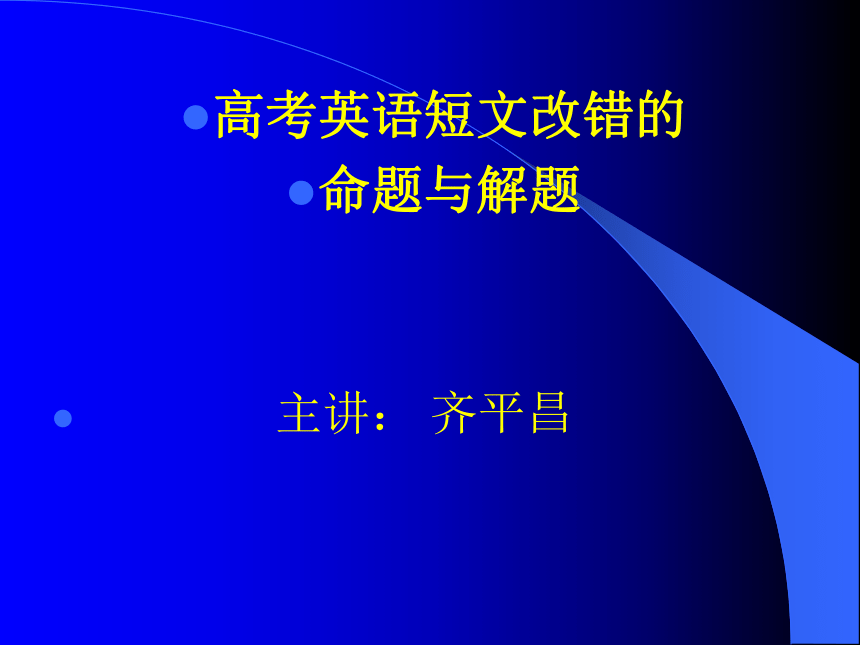
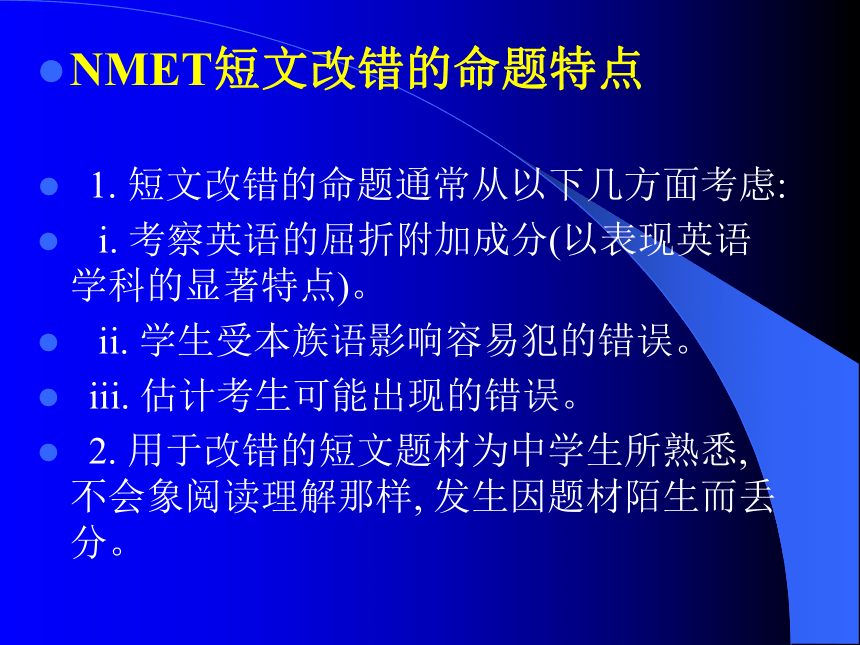
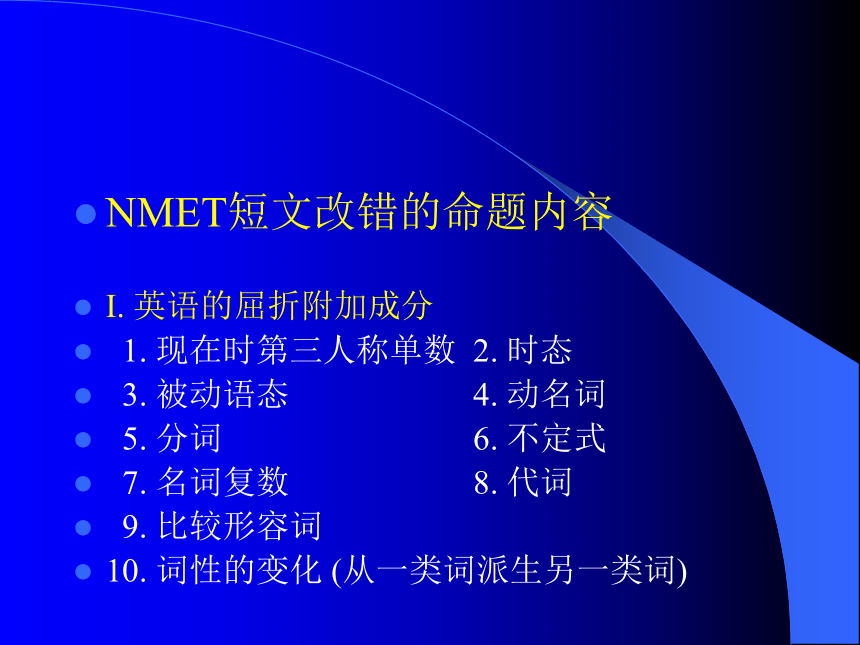
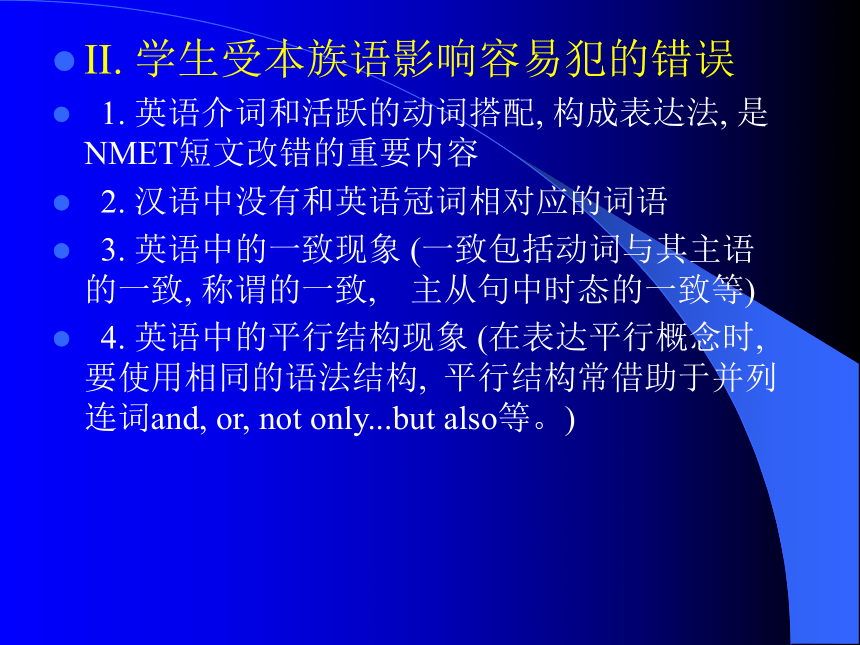
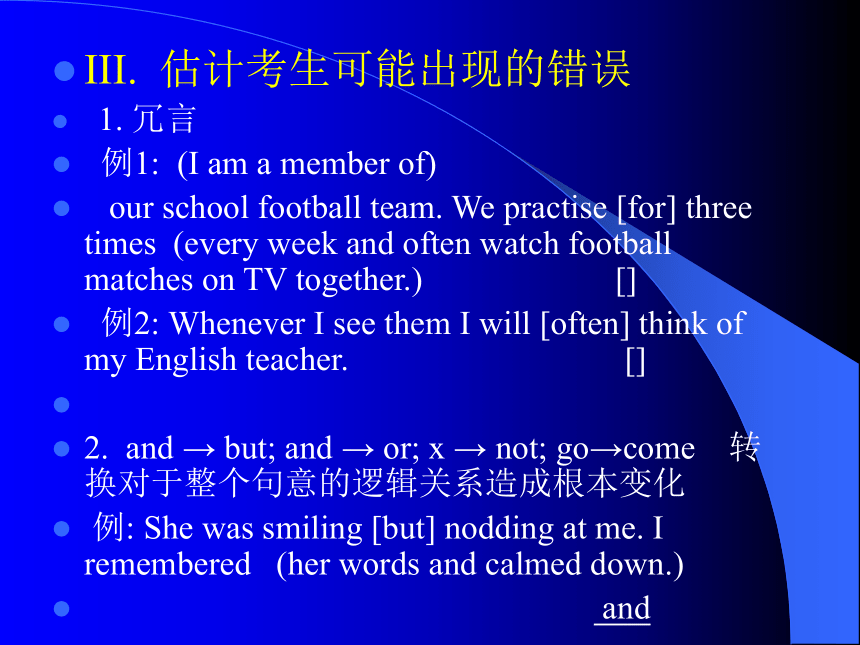
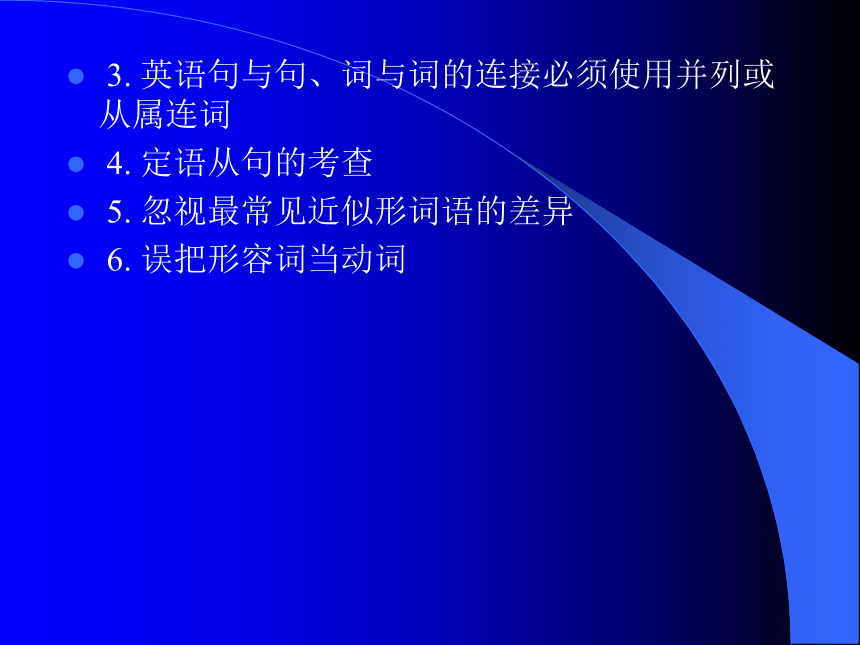
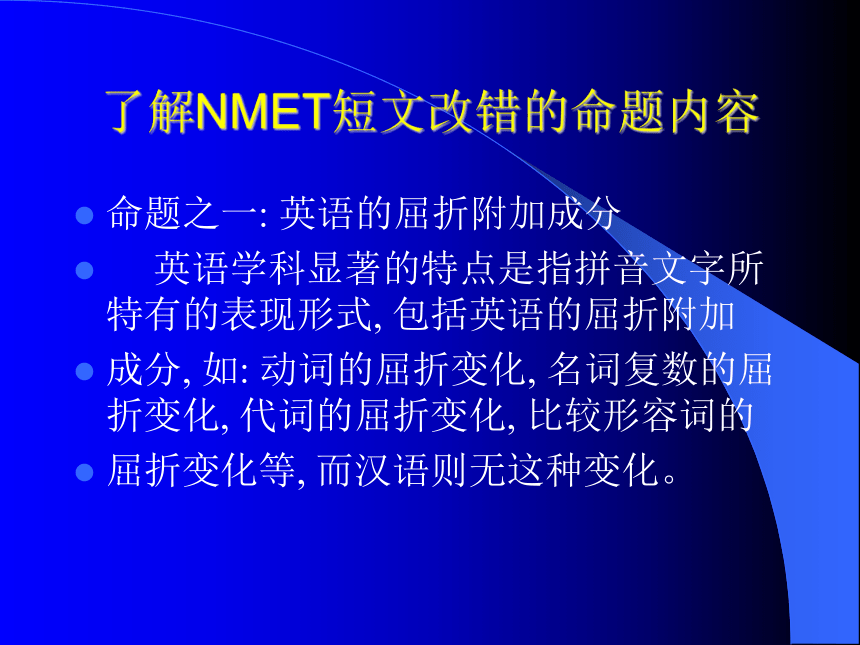
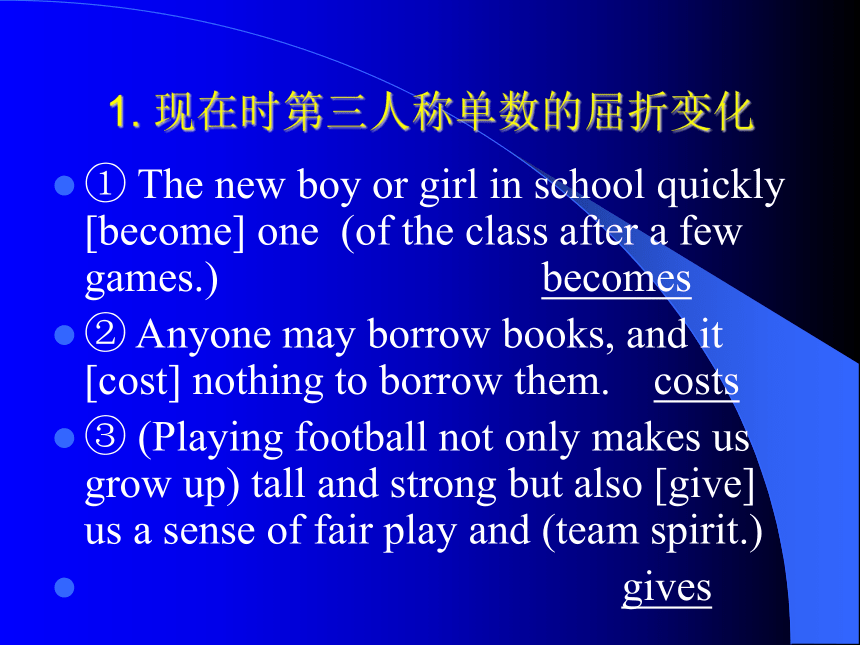
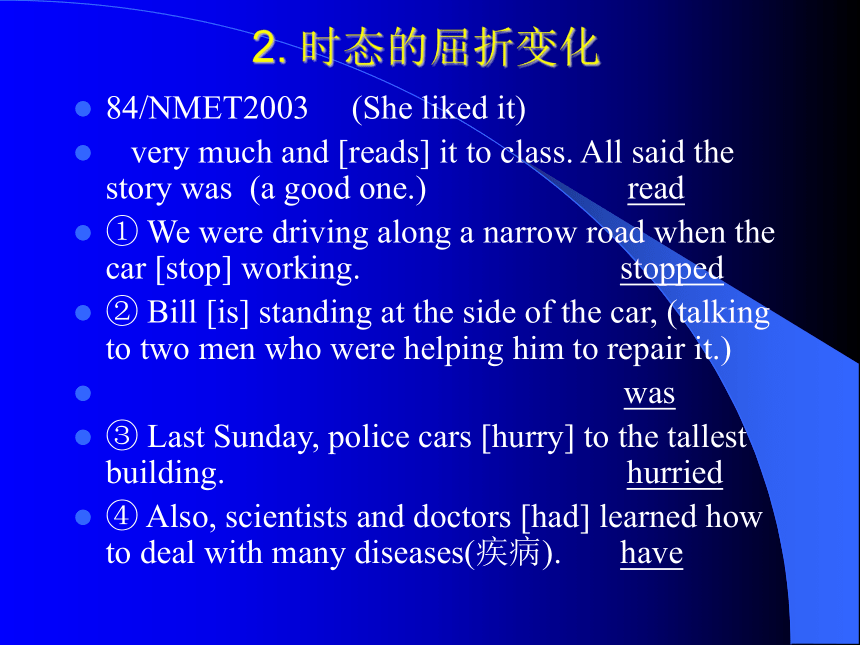
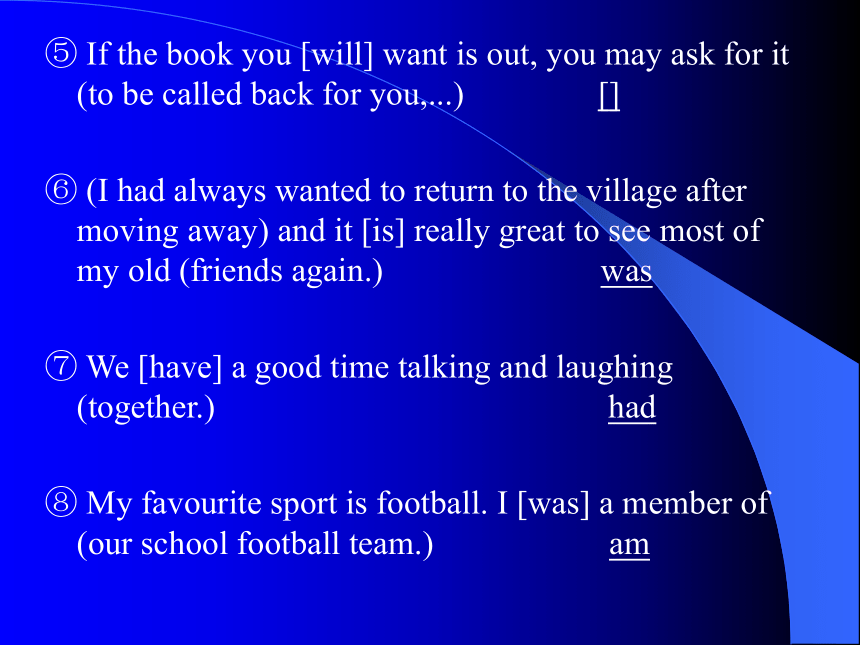
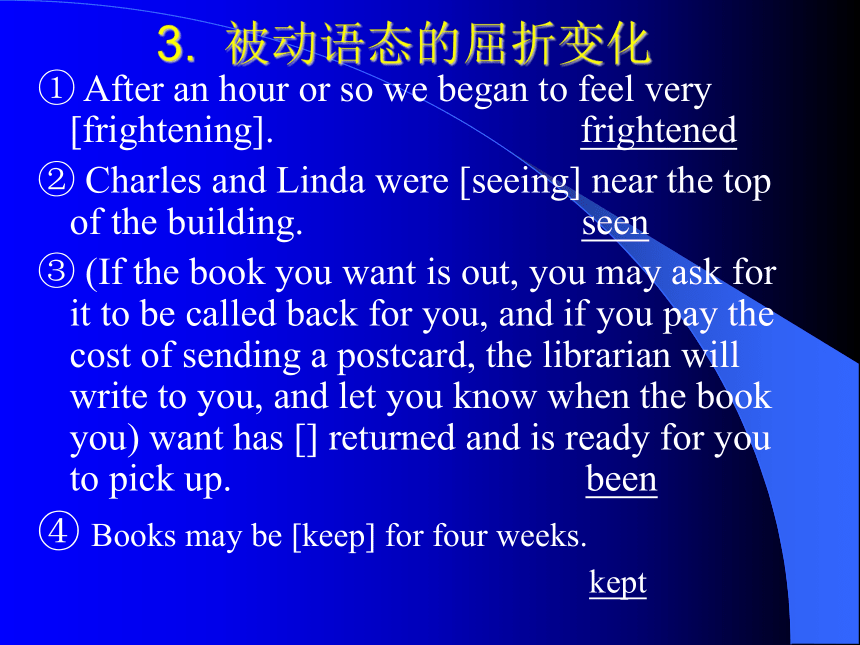
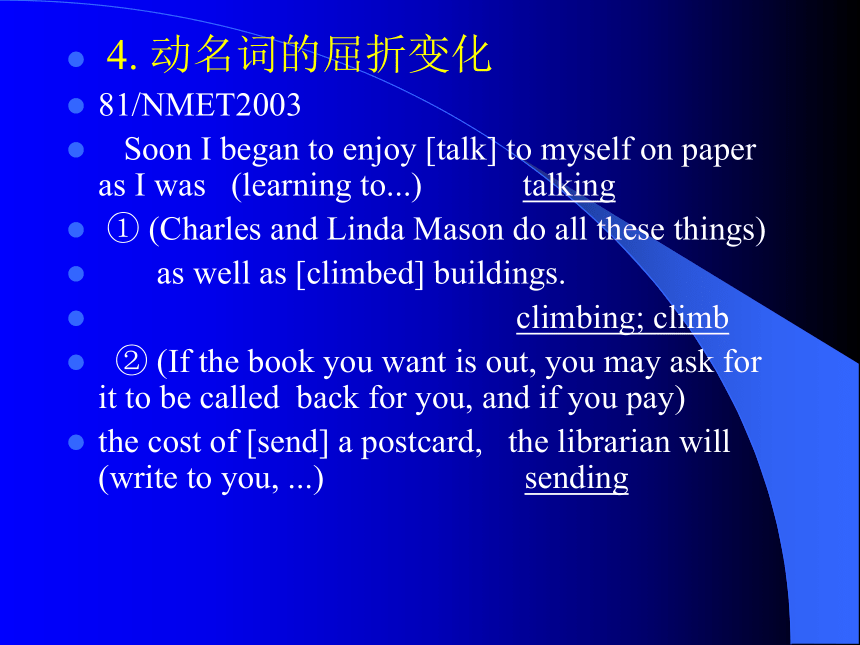
文档简介
课件128张PPT。
高考英语短文改错的
命题与解题
主讲: 齐平昌 NMET短文改错的命题特点
1. 短文改错的命题通常从以下几方面考虑:
i. 考察英语的屈折附加成分(以表现英语学科的显著特点)。
ii. 学生受本族语影响容易犯的错误。
iii. 估计考生可能出现的错误。
2. 用于改错的短文题材为中学生所熟悉, 不会象阅读理解那样, 发生因题材陌生而丢分。
NMET短文改错的命题内容
I. 英语的屈折附加成分
1. 现在时第三人称单数 2. 时态
3. 被动语态 4. 动名词
5. 分词 6. 不定式
7. 名词复数 8. 代词
9. 比较形容词
10. 词性的变化 (从一类词派生另一类词)
II. 学生受本族语影响容易犯的错误
1. 英语介词和活跃的动词搭配, 构成表达法, 是NMET短文改错的重要内容
2. 汉语中没有和英语冠词相对应的词语
3. 英语中的一致现象 (一致包括动词与其主语的一致, 称谓的一致,主从句中时态的一致等)
4. 英语中的平行结构现象 (在表达平行概念时, 要使用相同的语法结构, 平行结构常借助于并列连词and, or, not only...but also等。)
III. 估计考生可能出现的错误
1. 冗言
例1: (I am a member of)
our school football team. We practise [for] three times (every week and often watch football matches on TV together.) []
例2: Whenever I see them I will [often] think of my English teacher. []
2. and → but; and → or; x → not; go→come转换对于整个句意的逻辑关系造成根本变化
例: She was smiling [but] nodding at me. I remembered (her words and calmed down.)
and 3. 英语句与句、词与词的连接必须使用并列或从属连词
4. 定语从句的考查
5. 忽视最常见近似形词语的差异
6. 误把形容词当动词
了解NMET短文改错的命题内容命题之一: 英语的屈折附加成分
英语学科显著的特点是指拼音文字所特有的表现形式, 包括英语的屈折附加
成分, 如: 动词的屈折变化, 名词复数的屈折变化, 代词的屈折变化, 比较形容词的
屈折变化等, 而汉语则无这种变化。
1. 现在时第三人称单数的屈折变化① The new boy or girl in school quickly [become] one (of the class after a few games.) becomes
② Anyone may borrow books, and it [cost] nothing to borrow them. costs
③ (Playing football not only makes us grow up) tall and strong but also [give] us a sense of fair play and (team spirit.)
gives
2. 时态的屈折变化84/NMET2003 (She liked it)
very much and [reads] it to class. All said the story was (a good one.) read
① We were driving along a narrow road when the car [stop] working. stopped
② Bill [is] standing at the side of the car, (talking to two men who were helping him to repair it.)
was
③ Last Sunday, police cars [hurry] to the tallest building. hurried
④ Also, scientists and doctors [had] learned how to deal with many diseases(疾病). have
⑤ If the book you [will] want is out, you may ask for it (to be called back for you,...) []
⑥ (I had always wanted to return to the village after moving away) and it [is] really great to see most of my old (friends again.) was
⑦ We [have] a good time talking and laughing (together.) had
⑧ My favourite sport is football. I [was] a member of (our school football team.) am 2. 时态的屈折变化
3. 被动语态的屈折变化① After an hour or so we began to feel very [frightening]. frightened
② Charles and Linda were [seeing] near the top of the building. seen
③ (If the book you want is out, you may ask for it to be called back for you, and if you pay the cost of sending a postcard, the librarian will write to you, and let you know when the book you) want has [] returned and is ready for you to pick up. been
④ Books may be [keep] for four weeks.
kept
4. 动名词的屈折变化
81/NMET2003
Soon I began to enjoy [talk] to myself on paper as I was (learning to...) talking
① (Charles and Linda Mason do all these things)
as well as [climbed] buildings.
climbing; climb
② (If the book you want is out, you may ask for it to be called back for you, and if you pay)
the cost of [send] a postcard, the librarian will (write to you, ...) sending
③ I want to thank you again for [have] me in your
(home for the summer holidays.
having
④ I look forward to hear from you soon.
hearing
⑤ together. [Play] football not only makes us grow up
(tall and strong but also gives us a sense of fair play and team spirit.) Playing
5. 不定式① I went back to get David and helped him to [stood] up. stand
② The World Health Organization and other organizations are working [] improve health all over the world. to
③ (If the book you want is out, you may ask for it to be called back for you, and if you pay the cost of sending a postcard, the librarian will)
write to you, and let you [to] know when the book you (want has been returned and is ready for you to pick up.) []
④ (I had always) wanted [] return to the village after moving away
(and it was really great to see most of my old friends again.) to
⑤ I'd like to [] your penfriend, and get to
(know more about your country.)
be/become
6. 名词复数的屈折变化① Different people speak different [language], ...
languages
② We stopped to rest for a while and to drink some [waters] from a stream.
water
③ We have been to Europe many [time].
times
④There are branch [library] in many villages.
libraries
⑤ (I hope that you two could come and visit us)
some [times] soon. time
④There are branch [library] in many villages.
libraries
⑤ (I hope that you two could come and visit us)
some [times] soon. time
⑥ We study quite a few [subject], such as maths, Chinese, (English and physics.) subjects
⑦ (We practise [for] three times)
every week and often watch football [match] on TV (together.) matches
85/NMET2003 (All said the story was)
a good one. Their [word] were a great encouragement to me. word → words7. 代词的屈折变化
82/NMET2003 (as I was)
learning to express [me] in simple English. One day I wrote (a little story...)
me → myself
① The game speaks for [themselves].
them/itself
② When we walked to the car, Bill smiled and shook [] head. his
③ (And I can't forget) the good food you
cooked for [I]. me 8. 比较形容词的屈折变化
① Police cars hurried to the [taller] building (in
New York.) tallest
② (As a result, people in the modern world) generally live much [more] longer than people in the past. []
③ (People in industrial countries can expect to live for) twice [so] long as people who lived a few hundred years ago. as
④ In some places you may borrow [] many books as you want, ... [as]9. 词性的变化 (从一类词派生另一类词是英语学科的又一显著特点。 不同的句法功能要求使用与之相适应的词性)
① A player's native language is not [importance]. important
② I'm sure we'll have a [wonderfully] time together. wonderful
命题之二: 学生受本族语影响容易犯的错误1. 英语介词远比汉语介词活跃这一特性(介词常和活跃的动词搭配, 构成表达法, 是NMET短文改错的重要内容)
① People in different parts [in] the world learn to understand one another through sports.
of
② People in different parts of the world learn to understand one [with] another through sports.
[]
④ Suddenly we caught sight [at] a car and
some men. of
⑤ When I have free time I go [] a long walk.
for
⑥ When they came down the police were
angry [to] them. with
⑦ Most people can quickly get [for] help
from a doctor or go to a hospital if they are
ill. []
⑧ (Newly-published novels are always in great demand, ) and some books, for example, books [for] history, (science, cooking and gardening are also popular.) on
⑨ (I [was] a member of) our school football team. We practise [for] three times
(every week and often watch football [match] on TV together.) []
⑩ (We must keep in mind that we play)
for the team instead [] ourselves. Also, the sport (teaches us the importance of
obedience服从).
of
2. 汉语中没有和英语冠词相对应的词语这一特性, 考生在使用英语冠词方面常常缺乏良好的意识和习惯
79/NMET2003
My teacher advised me to keep [my] diary. I followed her (advice and ...) my → a
① One does not need to understand the language
of [] other. the
② Some people read [the] books or watch television while others have sports. []
③ Good health is [] person's most valuable possession. a
④ Modern people know more about [the] health, have better food, (and live in cleaner surroundings.) []
⑤ There is [] public library in every town in Britain.
a
⑥ Maybe you could come during [a] winter (holidays.)
the
⑦ (Today I visited the Smiths--my first visit) to [a]
American family. an
⑧ (Each) player must obey [] captain, who is the
leader of (the team.) the
⑨ The day before the speech contest(比赛) [] English
teacher (talked to me.) my
3. 忽视英语中的一致现象 (一致包括动词与其主语的一致, 称谓的一致, 主从句中时态的一致等)
① (Different people speak different languages, but sports have a language of [its] own. their
② The game speaks for [themselves].
itself
③ (The new boy or girl in school quickly becomes) one of the class after [] few games.
a
④ The new boy or girl in school quickly [become] (one of the class after a few games.) becomes
⑤ ...talking to two men who [was] helping him to repair it. were
⑥ (Today, it is much easier to be healthy than)
it [is] in the past. was
⑦ The Smiths did [his] best to make me feel (at home.) their
⑧ the team. And [they] must not break the rules too
(often if we want to win the game. ) we
⑨ (I did a good job and won the first)
prize. Now my picture and the prize [is] hanging in the library. are
4. 忽视英语中的平行结构现象 (在表达平行概念时, 要使用相同的语法结构, 即动词与动词相配, 其时态及其形式应一致; 形容词与形容词相配, 要注意只有程度相当的形容词才能配合使用, 即原级形容词与原级形容词相配, 比较级形容词与比较级形容词相配, 最高级形容词与最高级形容词相配; 分词语与分词相配, 不定式与不定式相配, 短语与短语相配; 平行结构常借助于并列连词and, or等。)
80/NMET2003 (I followed her)
advice and [should] put down 100 words or so each day. 去掉should
84/NMET2003 (She liked it)
very much and [reads] it to class. All said the story was (a good one.) reads → read
① (He said it was best to stay until help arrived) rather than go into the forest and [getting] lost. get
② (Modern people know more about the health, have) better food, and [to] live in cleaner surroundings. []
③ Anyone may borrow books, and it [cost] nothing to borrow them. costs
④ (If the book you want is out, you may ask for it) to be called back for you, and [whether] you pay (the cost of sending a
postcard, the librarian will write ...) if
⑤ (It was very kind of them to meet me) at the railway station and [drove] me to their home.
drive
⑥ (Playing football not only makes us grow up)
tall and strong but also [give] us a sense of fair play and (team spirit.) gives
⑦ (I was often) a little tired after a day's work
and [watch] TV (demands very little effort).
watching
⑧ (I remembered) her words and [calm] down.
I did a good job and won the first (prize.)
calmed
命题之三: 估计考生可能出现的错误 1. 冗言
77/NMET2003 (I ran into many)
difficulties. The main problem was [in] that I always thought
(in Chinese and... ) was in that → was that
① (As a result, people in the modern world) generally live much [more] longer than people in the past. []
② Most people can quickly get [for] help from a doctor or go to a hospital if they are ill. []
③ I never knew [about] a ride down (a river could be so exciting.) []/that
④ (I never knew a ride down) a river could be so [much] exciting. []
⑤ (I also enjoyed the) evenings [when] we spent together. []
⑥ I hope that [both] you two could come and visit
us []
⑦ Today I visited the Smiths--my first [time] visit (to an American family.) []
⑧ (In fact) they are planning to visit China [in] next year. []
⑨ First, let me tell you something [more] about myself. []
⑩ (I [was] a member of)
our school football team. We practise [for] three times
(every week and often watch football matches on TV together.) []
(11) Whenever I see them I will [often] think of
my English teacher. []
2. and → but; and → or; x → not; go→come 对于整个句意的逻辑关系所造成根本变化
78/NMET2003 (I always thought)
in Chinese and tried to translate [anything] into English. anything → everything
① A football player from Japan can [not] play with (a player from England.) []
② (The new person on the job feels better after)
he [and] she has played tennis with other
(people in the office. ) or
③ We tried to fix it [and] there was nothing (we could do.) but
④ [Therefore], there are still some countries
where (people have shorter lives.) However
⑤ Uncle Ben will also [go] back for Christmas.
come
→以写信人所在地为中心, 使用"come", 以避免句子产生歧义。
⑥ She was smiling [but] nodding at me. I remembered (her words and calmed down.)
and
3. 英语句与句、词与词的连接必须使用并列或从属连词这一特性 ① I told Mother, Father, Sister, [] all my friends (here what a great time I had.)
and
② (I told Mother, Father, Sister, and all my friends)
here [that] a great time I had.) what
4. NMET短文改错重视对定语从句的考查 ① People [] do not know each other often become friends after they have played together.
who/that
② However, David and I did not agree and David pointed to a path which [it] he thought would probably lead to a village.
[]
③ In the last five years [that] they have climbed churches, (high building and television towers.)
[]
④ (However, there are still some countries) [there] people have shorter lives.
where
⑤ (In some places you may borrow as many books as you want, in other places you are limited to a certain) number, of [that] some may be novels. which
⑥ My name is Li Hua. I live in Beijing, [where] is the (capital of China.)
which
5. 忽视最常见近似形词语的差异
He [lied] down by the side of the path to rest. lay
6. 误把形容词当动词
They [] eager to know everything about (China and asked me lots of questions.)
were
NMET短文改错的解题What should you do when your parents become angry? 1. √
点评: 多年来NMET短文改错一般考虑在文章
首行的后半部命题, 但NMET2001, 2002(京) 2003命题在文章的首行连续出现正确句答案, , 应引起关注。
需要指出的是首行第1个动词的时态一般不会有误, 其形式表明该段文章 `时态的基准点'。 建议在此句中留意动词`become'的时态。
If your parents [got] mad, try to have a conversation with them (about it). get
点评:NMET短文改错重视对动词时态的屈折变化的考查, 如NMET2001:
(.. and will do all they can to make sure)
that I get a good education. They [did] not want me
(to do any work at home…) do
重要提示: 动词时态由现在时错误地"跳"到过去时或反之, 是该题型最重要的命题考虑之一。
(If your parents get mad, try to have a conversation with them )
about it. [Remembering] not to shout at them. They usually Remember
(will try to change, ...)
点评: Remembering若不是用作现在分词短语作状语, 就应考虑将其`ing‘去掉, 而改为祈使句用法。句或句式的准确性是解题应该留意的内容。其中关注标点符号, 包括逗号、句号出现的场合和时机是十分必要的。 (They usually)
will try to change, but [they] will take some time because it
(they get angry all their life, and that is all they know.)
点评: 该题涉及对代词的指代对象准确性的考查, 是该题型重要的命题考虑之一,
如NMET98:
(Each player must obey the captain, who is the leader of)
the team. And [they] must not break the rules too (often if we want to win the game.) we (..., but it will take some time because)
they get angry all their [life], and that is all they
know. You lives
(might have to change for your method a couple of times.)
点评: `life'用作不可数名词, 意为`人生, 生活, 生存';
`life'用作可数名词, 意为`一生, 终生'。
例: They have very busy lives. 他们终生忙碌。
该题涉及到对名词单复数判断的考查, 此考点是该题型最常见的命题现象。
如NMET2001:
[they want me to devote all my time to] my studies so that I'll get good marks in all my [subject]. subjects (You)
might have to change [for] your method a couple of times. []
点评: change为及物动词, 其后应接用其宾语。
Do [any] nice things for your parents that they don't expect some
(---like cooking, doing the dishes, ...)
点评: i. any若作定语, 用于肯定句时, 应后接单数名词, 如: Any nice book will do.
ii. 若说话者肯定意味强时, 用`some'; 不用`any'。
Why don't you bring some magazines with you?
You'd better read some magazines on the train.
iii. 考题中若出现诸如`something, any, everything’ 等字眼时, 应予留意。
(... that they don't expect) ---like cooking, doing the dishes, washing clothes, or [clean] (the floors.)
cleaning
点评: 该题涉及到平行结构现象。在表达平行概念时, 要使用相同的语法结构。 就本题而言, 通过并列连词`or', 平行使用3个动名词。
NMET短文改错命制重视对英语中的平行结构现象考查, 如NMET2000:
(I remembered)
her words and [calm] down. I did a good job and won the first (prize.) calmed
If this doesn't work, bring in [] friend that you (feel comfortable, ...) a
点评: i. 考生可能会认为将`friend'改为`friends'也可, 但问题出在后面所给的
`... and have him or her help you'上面。通过`him or her'使得 `friend'一词只有一种改法。
ii. NMET短文改错重视对冠词的考查。由于汉语中没有和英语冠词相对应的词语, 这一特性使考生在使用英语冠词方面缺乏良好的意识和习惯。此点应予留意。 (You)
feel comfortable ∧, and have him or her help you.
with 点评: i. 因其前有`that you feel comfortable‘ 容易使考生产生`(so) that you (may) feel comfortable‘
的理解。此题命题十分精彩。
ii. 关系代词`that'引出的定语从句应是不完整的句子; 在`you feel comfortable'之后加用介词`with'形成正确的定语从句。
B │Like most of my schoolmates, I have neither brothers nor 1. √ ││[sisters]. │【点评】多年来NMET短文改错一般考虑在文章首行的后半部命题, 如NMET2000、NMET99、 NMET98等都是这样, 而NMET2001短文改错命题在文章的首行第一次出现 正确句答案, 这可能考虑到首行的后半部内容"have neither brothers nor" 所具备的命题单元"have →had(时态命题)";"brothers →brother(名词复数 命题); neither...nor →neither...or(并列连词命题)与文章的第79题 "did → do(时态)"; 第81题"subject →subjects(名词复数)"; 第84题 "and → or(并列连词)"命题角度或内容重叠有关。 NMET2001短文改错在 文章的首行第一次出现正确句答案这一现象, 可能并不具备典型性。│[I have neither brothers nor] ││sisters - in [any] other words, I am an only child. My parents2. [] ││[love me dearly of course...] │【解】`in other words'意思为`换句话说'【点评】 该题涉及到冗言式的错误类型。对NMET英语科说明中405条短语的准确记忆是 解此类题的关键。│[My parents] ││love me dearly of course and will do all they can / make sure 3. to ││[that I get a good education.] │【点评】NMET短文改错重视对动词不定式的考查, 如: 例1 [The World Health Organization and other organizations] are working [] improve health all over the world. to 例2 [If the book you want is out, you may ask for it to be called back for you, and if you pay the cost of sending a postcard, the librarian will] write to you, and let you [to] know when the book you [] [want has been returned and is ready for you to pick up.]│[... and will do all they can to make sure] ││that I get a good education. They [did] not want me to do 4. do ││[any work at home...] │【点评】NMET短文改错重视对动词时态的屈折变化的考查, 如: 例1 We were driving along a narrow road when the car [stop] working. stopped 例2 Bill [is] standing at the side of the car, was [talking to two men who were helping him to repair it.] │[They do not want me to do] ││any work at [family]; they want me to devote all my time to 5. home ││[my studies so that I'll get good marks...] │【解】 i. at home; in one's family ii. NMET2001短文改错涉及到短语的命题还有"in other words""the same"。│[they want me to devote all my time to] ││my studies so that I'll get good marks in all my [subject]. We 6. subjects │【点评】 该题涉及到对名词单复数判断的考查, 此考点是该题型最常见到的命题现象。 有关名词复数的屈折变化的考查归类如下: 例1 Different people speak different [language], ... languages 例2 We have been to Europe many [time]. times │[We] ││may be one family and live under [a] same roof, but we do 7. the ││[not seem to get much time to talk together.] │【解】`same'一定要和定冠词`the'搭配使用。 【点评】NMET短文改错重视对冠词的考查。由于汉语中没有和英语冠词相对应的词语, 这一特性使考生在使用英语冠词方面缺乏良好的意识和习惯。 例1 One does not need to understand the language of [] other. the 例2 Some people read [the] books or watch television [] [while others have sports.] │[but we do] ││not seem to get much time to talk [about] together. It looks 8. [] ││[as if my parents treat me...] │【点评】NMET短文改错重视对冗言错误的考查。本届试题就两次考到这一现象。 例1 [As a result, people in the modern world] generally live much [more] longer than people in the past. [] 例2 Most people can quickly get [for] help from a doctor or [go to a hospital if they are ill.] [] │[It looks] ││as if my parents treat me as a visitor [and] a guest. Do they 9. or ││[really understand their own daughter?] │【解】`A or B'二者择其一, 而并非两者都是。【点评】NMET短文改错重视对包括连词在内的逻辑关系的考查, 内容有: and - but; and - or; 肯定 - 否定; go - come 等的相互变化, 造成对于 整个句意的逻辑关系的影响。 例1 A football player from Japan can [not] play with [] [a player from England.] 例2 [The new person on the job feels better after] he [and] she has played tennis with other or [people in the office. ]│[Do they] │
命题与解题
主讲: 齐平昌 NMET短文改错的命题特点
1. 短文改错的命题通常从以下几方面考虑:
i. 考察英语的屈折附加成分(以表现英语学科的显著特点)。
ii. 学生受本族语影响容易犯的错误。
iii. 估计考生可能出现的错误。
2. 用于改错的短文题材为中学生所熟悉, 不会象阅读理解那样, 发生因题材陌生而丢分。
NMET短文改错的命题内容
I. 英语的屈折附加成分
1. 现在时第三人称单数 2. 时态
3. 被动语态 4. 动名词
5. 分词 6. 不定式
7. 名词复数 8. 代词
9. 比较形容词
10. 词性的变化 (从一类词派生另一类词)
II. 学生受本族语影响容易犯的错误
1. 英语介词和活跃的动词搭配, 构成表达法, 是NMET短文改错的重要内容
2. 汉语中没有和英语冠词相对应的词语
3. 英语中的一致现象 (一致包括动词与其主语的一致, 称谓的一致,主从句中时态的一致等)
4. 英语中的平行结构现象 (在表达平行概念时, 要使用相同的语法结构, 平行结构常借助于并列连词and, or, not only...but also等。)
III. 估计考生可能出现的错误
1. 冗言
例1: (I am a member of)
our school football team. We practise [for] three times (every week and often watch football matches on TV together.) []
例2: Whenever I see them I will [often] think of my English teacher. []
2. and → but; and → or; x → not; go→come转换对于整个句意的逻辑关系造成根本变化
例: She was smiling [but] nodding at me. I remembered (her words and calmed down.)
and 3. 英语句与句、词与词的连接必须使用并列或从属连词
4. 定语从句的考查
5. 忽视最常见近似形词语的差异
6. 误把形容词当动词
了解NMET短文改错的命题内容命题之一: 英语的屈折附加成分
英语学科显著的特点是指拼音文字所特有的表现形式, 包括英语的屈折附加
成分, 如: 动词的屈折变化, 名词复数的屈折变化, 代词的屈折变化, 比较形容词的
屈折变化等, 而汉语则无这种变化。
1. 现在时第三人称单数的屈折变化① The new boy or girl in school quickly [become] one (of the class after a few games.) becomes
② Anyone may borrow books, and it [cost] nothing to borrow them. costs
③ (Playing football not only makes us grow up) tall and strong but also [give] us a sense of fair play and (team spirit.)
gives
2. 时态的屈折变化84/NMET2003 (She liked it)
very much and [reads] it to class. All said the story was (a good one.) read
① We were driving along a narrow road when the car [stop] working. stopped
② Bill [is] standing at the side of the car, (talking to two men who were helping him to repair it.)
was
③ Last Sunday, police cars [hurry] to the tallest building. hurried
④ Also, scientists and doctors [had] learned how to deal with many diseases(疾病). have
⑤ If the book you [will] want is out, you may ask for it (to be called back for you,...) []
⑥ (I had always wanted to return to the village after moving away) and it [is] really great to see most of my old (friends again.) was
⑦ We [have] a good time talking and laughing (together.) had
⑧ My favourite sport is football. I [was] a member of (our school football team.) am 2. 时态的屈折变化
3. 被动语态的屈折变化① After an hour or so we began to feel very [frightening]. frightened
② Charles and Linda were [seeing] near the top of the building. seen
③ (If the book you want is out, you may ask for it to be called back for you, and if you pay the cost of sending a postcard, the librarian will write to you, and let you know when the book you) want has [] returned and is ready for you to pick up. been
④ Books may be [keep] for four weeks.
kept
4. 动名词的屈折变化
81/NMET2003
Soon I began to enjoy [talk] to myself on paper as I was (learning to...) talking
① (Charles and Linda Mason do all these things)
as well as [climbed] buildings.
climbing; climb
② (If the book you want is out, you may ask for it to be called back for you, and if you pay)
the cost of [send] a postcard, the librarian will (write to you, ...) sending
③ I want to thank you again for [have] me in your
(home for the summer holidays.
having
④ I look forward to hear from you soon.
hearing
⑤ together. [Play] football not only makes us grow up
(tall and strong but also gives us a sense of fair play and team spirit.) Playing
5. 不定式① I went back to get David and helped him to [stood] up. stand
② The World Health Organization and other organizations are working [] improve health all over the world. to
③ (If the book you want is out, you may ask for it to be called back for you, and if you pay the cost of sending a postcard, the librarian will)
write to you, and let you [to] know when the book you (want has been returned and is ready for you to pick up.) []
④ (I had always) wanted [] return to the village after moving away
(and it was really great to see most of my old friends again.) to
⑤ I'd like to [] your penfriend, and get to
(know more about your country.)
be/become
6. 名词复数的屈折变化① Different people speak different [language], ...
languages
② We stopped to rest for a while and to drink some [waters] from a stream.
water
③ We have been to Europe many [time].
times
④There are branch [library] in many villages.
libraries
⑤ (I hope that you two could come and visit us)
some [times] soon. time
④There are branch [library] in many villages.
libraries
⑤ (I hope that you two could come and visit us)
some [times] soon. time
⑥ We study quite a few [subject], such as maths, Chinese, (English and physics.) subjects
⑦ (We practise [for] three times)
every week and often watch football [match] on TV (together.) matches
85/NMET2003 (All said the story was)
a good one. Their [word] were a great encouragement to me. word → words7. 代词的屈折变化
82/NMET2003 (as I was)
learning to express [me] in simple English. One day I wrote (a little story...)
me → myself
① The game speaks for [themselves].
them/itself
② When we walked to the car, Bill smiled and shook [] head. his
③ (And I can't forget) the good food you
cooked for [I]. me 8. 比较形容词的屈折变化
① Police cars hurried to the [taller] building (in
New York.) tallest
② (As a result, people in the modern world) generally live much [more] longer than people in the past. []
③ (People in industrial countries can expect to live for) twice [so] long as people who lived a few hundred years ago. as
④ In some places you may borrow [] many books as you want, ... [as]9. 词性的变化 (从一类词派生另一类词是英语学科的又一显著特点。 不同的句法功能要求使用与之相适应的词性)
① A player's native language is not [importance]. important
② I'm sure we'll have a [wonderfully] time together. wonderful
命题之二: 学生受本族语影响容易犯的错误1. 英语介词远比汉语介词活跃这一特性(介词常和活跃的动词搭配, 构成表达法, 是NMET短文改错的重要内容)
① People in different parts [in] the world learn to understand one another through sports.
of
② People in different parts of the world learn to understand one [with] another through sports.
[]
④ Suddenly we caught sight [at] a car and
some men. of
⑤ When I have free time I go [] a long walk.
for
⑥ When they came down the police were
angry [to] them. with
⑦ Most people can quickly get [for] help
from a doctor or go to a hospital if they are
ill. []
⑧ (Newly-published novels are always in great demand, ) and some books, for example, books [for] history, (science, cooking and gardening are also popular.) on
⑨ (I [was] a member of) our school football team. We practise [for] three times
(every week and often watch football [match] on TV together.) []
⑩ (We must keep in mind that we play)
for the team instead [] ourselves. Also, the sport (teaches us the importance of
obedience服从).
of
2. 汉语中没有和英语冠词相对应的词语这一特性, 考生在使用英语冠词方面常常缺乏良好的意识和习惯
79/NMET2003
My teacher advised me to keep [my] diary. I followed her (advice and ...) my → a
① One does not need to understand the language
of [] other. the
② Some people read [the] books or watch television while others have sports. []
③ Good health is [] person's most valuable possession. a
④ Modern people know more about [the] health, have better food, (and live in cleaner surroundings.) []
⑤ There is [] public library in every town in Britain.
a
⑥ Maybe you could come during [a] winter (holidays.)
the
⑦ (Today I visited the Smiths--my first visit) to [a]
American family. an
⑧ (Each) player must obey [] captain, who is the
leader of (the team.) the
⑨ The day before the speech contest(比赛) [] English
teacher (talked to me.) my
3. 忽视英语中的一致现象 (一致包括动词与其主语的一致, 称谓的一致, 主从句中时态的一致等)
① (Different people speak different languages, but sports have a language of [its] own. their
② The game speaks for [themselves].
itself
③ (The new boy or girl in school quickly becomes) one of the class after [] few games.
a
④ The new boy or girl in school quickly [become] (one of the class after a few games.) becomes
⑤ ...talking to two men who [was] helping him to repair it. were
⑥ (Today, it is much easier to be healthy than)
it [is] in the past. was
⑦ The Smiths did [his] best to make me feel (at home.) their
⑧ the team. And [they] must not break the rules too
(often if we want to win the game. ) we
⑨ (I did a good job and won the first)
prize. Now my picture and the prize [is] hanging in the library. are
4. 忽视英语中的平行结构现象 (在表达平行概念时, 要使用相同的语法结构, 即动词与动词相配, 其时态及其形式应一致; 形容词与形容词相配, 要注意只有程度相当的形容词才能配合使用, 即原级形容词与原级形容词相配, 比较级形容词与比较级形容词相配, 最高级形容词与最高级形容词相配; 分词语与分词相配, 不定式与不定式相配, 短语与短语相配; 平行结构常借助于并列连词and, or等。)
80/NMET2003 (I followed her)
advice and [should] put down 100 words or so each day. 去掉should
84/NMET2003 (She liked it)
very much and [reads] it to class. All said the story was (a good one.) reads → read
① (He said it was best to stay until help arrived) rather than go into the forest and [getting] lost. get
② (Modern people know more about the health, have) better food, and [to] live in cleaner surroundings. []
③ Anyone may borrow books, and it [cost] nothing to borrow them. costs
④ (If the book you want is out, you may ask for it) to be called back for you, and [whether] you pay (the cost of sending a
postcard, the librarian will write ...) if
⑤ (It was very kind of them to meet me) at the railway station and [drove] me to their home.
drive
⑥ (Playing football not only makes us grow up)
tall and strong but also [give] us a sense of fair play and (team spirit.) gives
⑦ (I was often) a little tired after a day's work
and [watch] TV (demands very little effort).
watching
⑧ (I remembered) her words and [calm] down.
I did a good job and won the first (prize.)
calmed
命题之三: 估计考生可能出现的错误 1. 冗言
77/NMET2003 (I ran into many)
difficulties. The main problem was [in] that I always thought
(in Chinese and... ) was in that → was that
① (As a result, people in the modern world) generally live much [more] longer than people in the past. []
② Most people can quickly get [for] help from a doctor or go to a hospital if they are ill. []
③ I never knew [about] a ride down (a river could be so exciting.) []/that
④ (I never knew a ride down) a river could be so [much] exciting. []
⑤ (I also enjoyed the) evenings [when] we spent together. []
⑥ I hope that [both] you two could come and visit
us []
⑦ Today I visited the Smiths--my first [time] visit (to an American family.) []
⑧ (In fact) they are planning to visit China [in] next year. []
⑨ First, let me tell you something [more] about myself. []
⑩ (I [was] a member of)
our school football team. We practise [for] three times
(every week and often watch football matches on TV together.) []
(11) Whenever I see them I will [often] think of
my English teacher. []
2. and → but; and → or; x → not; go→come 对于整个句意的逻辑关系所造成根本变化
78/NMET2003 (I always thought)
in Chinese and tried to translate [anything] into English. anything → everything
① A football player from Japan can [not] play with (a player from England.) []
② (The new person on the job feels better after)
he [and] she has played tennis with other
(people in the office. ) or
③ We tried to fix it [and] there was nothing (we could do.) but
④ [Therefore], there are still some countries
where (people have shorter lives.) However
⑤ Uncle Ben will also [go] back for Christmas.
come
→以写信人所在地为中心, 使用"come", 以避免句子产生歧义。
⑥ She was smiling [but] nodding at me. I remembered (her words and calmed down.)
and
3. 英语句与句、词与词的连接必须使用并列或从属连词这一特性 ① I told Mother, Father, Sister, [] all my friends (here what a great time I had.)
and
② (I told Mother, Father, Sister, and all my friends)
here [that] a great time I had.) what
4. NMET短文改错重视对定语从句的考查 ① People [] do not know each other often become friends after they have played together.
who/that
② However, David and I did not agree and David pointed to a path which [it] he thought would probably lead to a village.
[]
③ In the last five years [that] they have climbed churches, (high building and television towers.)
[]
④ (However, there are still some countries) [there] people have shorter lives.
where
⑤ (In some places you may borrow as many books as you want, in other places you are limited to a certain) number, of [that] some may be novels. which
⑥ My name is Li Hua. I live in Beijing, [where] is the (capital of China.)
which
5. 忽视最常见近似形词语的差异
He [lied] down by the side of the path to rest. lay
6. 误把形容词当动词
They [] eager to know everything about (China and asked me lots of questions.)
were
NMET短文改错的解题What should you do when your parents become angry? 1. √
点评: 多年来NMET短文改错一般考虑在文章
首行的后半部命题, 但NMET2001, 2002(京) 2003命题在文章的首行连续出现正确句答案, , 应引起关注。
需要指出的是首行第1个动词的时态一般不会有误, 其形式表明该段文章 `时态的基准点'。 建议在此句中留意动词`become'的时态。
If your parents [got] mad, try to have a conversation with them (about it). get
点评:NMET短文改错重视对动词时态的屈折变化的考查, 如NMET2001:
(.. and will do all they can to make sure)
that I get a good education. They [did] not want me
(to do any work at home…) do
重要提示: 动词时态由现在时错误地"跳"到过去时或反之, 是该题型最重要的命题考虑之一。
(If your parents get mad, try to have a conversation with them )
about it. [Remembering] not to shout at them. They usually Remember
(will try to change, ...)
点评: Remembering若不是用作现在分词短语作状语, 就应考虑将其`ing‘去掉, 而改为祈使句用法。句或句式的准确性是解题应该留意的内容。其中关注标点符号, 包括逗号、句号出现的场合和时机是十分必要的。 (They usually)
will try to change, but [they] will take some time because it
(they get angry all their life, and that is all they know.)
点评: 该题涉及对代词的指代对象准确性的考查, 是该题型重要的命题考虑之一,
如NMET98:
(Each player must obey the captain, who is the leader of)
the team. And [they] must not break the rules too (often if we want to win the game.) we (..., but it will take some time because)
they get angry all their [life], and that is all they
know. You lives
(might have to change for your method a couple of times.)
点评: `life'用作不可数名词, 意为`人生, 生活, 生存';
`life'用作可数名词, 意为`一生, 终生'。
例: They have very busy lives. 他们终生忙碌。
该题涉及到对名词单复数判断的考查, 此考点是该题型最常见的命题现象。
如NMET2001:
[they want me to devote all my time to] my studies so that I'll get good marks in all my [subject]. subjects (You)
might have to change [for] your method a couple of times. []
点评: change为及物动词, 其后应接用其宾语。
Do [any] nice things for your parents that they don't expect some
(---like cooking, doing the dishes, ...)
点评: i. any若作定语, 用于肯定句时, 应后接单数名词, 如: Any nice book will do.
ii. 若说话者肯定意味强时, 用`some'; 不用`any'。
Why don't you bring some magazines with you?
You'd better read some magazines on the train.
iii. 考题中若出现诸如`something, any, everything’ 等字眼时, 应予留意。
(... that they don't expect) ---like cooking, doing the dishes, washing clothes, or [clean] (the floors.)
cleaning
点评: 该题涉及到平行结构现象。在表达平行概念时, 要使用相同的语法结构。 就本题而言, 通过并列连词`or', 平行使用3个动名词。
NMET短文改错命制重视对英语中的平行结构现象考查, 如NMET2000:
(I remembered)
her words and [calm] down. I did a good job and won the first (prize.) calmed
If this doesn't work, bring in [] friend that you (feel comfortable, ...) a
点评: i. 考生可能会认为将`friend'改为`friends'也可, 但问题出在后面所给的
`... and have him or her help you'上面。通过`him or her'使得 `friend'一词只有一种改法。
ii. NMET短文改错重视对冠词的考查。由于汉语中没有和英语冠词相对应的词语, 这一特性使考生在使用英语冠词方面缺乏良好的意识和习惯。此点应予留意。 (You)
feel comfortable ∧, and have him or her help you.
with 点评: i. 因其前有`that you feel comfortable‘ 容易使考生产生`(so) that you (may) feel comfortable‘
的理解。此题命题十分精彩。
ii. 关系代词`that'引出的定语从句应是不完整的句子; 在`you feel comfortable'之后加用介词`with'形成正确的定语从句。
B │Like most of my schoolmates, I have neither brothers nor 1. √ ││[sisters]. │【点评】多年来NMET短文改错一般考虑在文章首行的后半部命题, 如NMET2000、NMET99、 NMET98等都是这样, 而NMET2001短文改错命题在文章的首行第一次出现 正确句答案, 这可能考虑到首行的后半部内容"have neither brothers nor" 所具备的命题单元"have →had(时态命题)";"brothers →brother(名词复数 命题); neither...nor →neither...or(并列连词命题)与文章的第79题 "did → do(时态)"; 第81题"subject →subjects(名词复数)"; 第84题 "and → or(并列连词)"命题角度或内容重叠有关。 NMET2001短文改错在 文章的首行第一次出现正确句答案这一现象, 可能并不具备典型性。│[I have neither brothers nor] ││sisters - in [any] other words, I am an only child. My parents2. [] ││[love me dearly of course...] │【解】`in other words'意思为`换句话说'【点评】 该题涉及到冗言式的错误类型。对NMET英语科说明中405条短语的准确记忆是 解此类题的关键。│[My parents] ││love me dearly of course and will do all they can / make sure 3. to ││[that I get a good education.] │【点评】NMET短文改错重视对动词不定式的考查, 如: 例1 [The World Health Organization and other organizations] are working [] improve health all over the world. to 例2 [If the book you want is out, you may ask for it to be called back for you, and if you pay the cost of sending a postcard, the librarian will] write to you, and let you [to] know when the book you [] [want has been returned and is ready for you to pick up.]│[... and will do all they can to make sure] ││that I get a good education. They [did] not want me to do 4. do ││[any work at home...] │【点评】NMET短文改错重视对动词时态的屈折变化的考查, 如: 例1 We were driving along a narrow road when the car [stop] working. stopped 例2 Bill [is] standing at the side of the car, was [talking to two men who were helping him to repair it.] │[They do not want me to do] ││any work at [family]; they want me to devote all my time to 5. home ││[my studies so that I'll get good marks...] │【解】 i. at home; in one's family ii. NMET2001短文改错涉及到短语的命题还有"in other words""the same"。│[they want me to devote all my time to] ││my studies so that I'll get good marks in all my [subject]. We 6. subjects │【点评】 该题涉及到对名词单复数判断的考查, 此考点是该题型最常见到的命题现象。 有关名词复数的屈折变化的考查归类如下: 例1 Different people speak different [language], ... languages 例2 We have been to Europe many [time]. times │[We] ││may be one family and live under [a] same roof, but we do 7. the ││[not seem to get much time to talk together.] │【解】`same'一定要和定冠词`the'搭配使用。 【点评】NMET短文改错重视对冠词的考查。由于汉语中没有和英语冠词相对应的词语, 这一特性使考生在使用英语冠词方面缺乏良好的意识和习惯。 例1 One does not need to understand the language of [] other. the 例2 Some people read [the] books or watch television [] [while others have sports.] │[but we do] ││not seem to get much time to talk [about] together. It looks 8. [] ││[as if my parents treat me...] │【点评】NMET短文改错重视对冗言错误的考查。本届试题就两次考到这一现象。 例1 [As a result, people in the modern world] generally live much [more] longer than people in the past. [] 例2 Most people can quickly get [for] help from a doctor or [go to a hospital if they are ill.] [] │[It looks] ││as if my parents treat me as a visitor [and] a guest. Do they 9. or ││[really understand their own daughter?] │【解】`A or B'二者择其一, 而并非两者都是。【点评】NMET短文改错重视对包括连词在内的逻辑关系的考查, 内容有: and - but; and - or; 肯定 - 否定; go - come 等的相互变化, 造成对于 整个句意的逻辑关系的影响。 例1 A football player from Japan can [not] play with [] [a player from England.] 例2 [The new person on the job feels better after] he [and] she has played tennis with other or [people in the office. ]│[Do they] │
